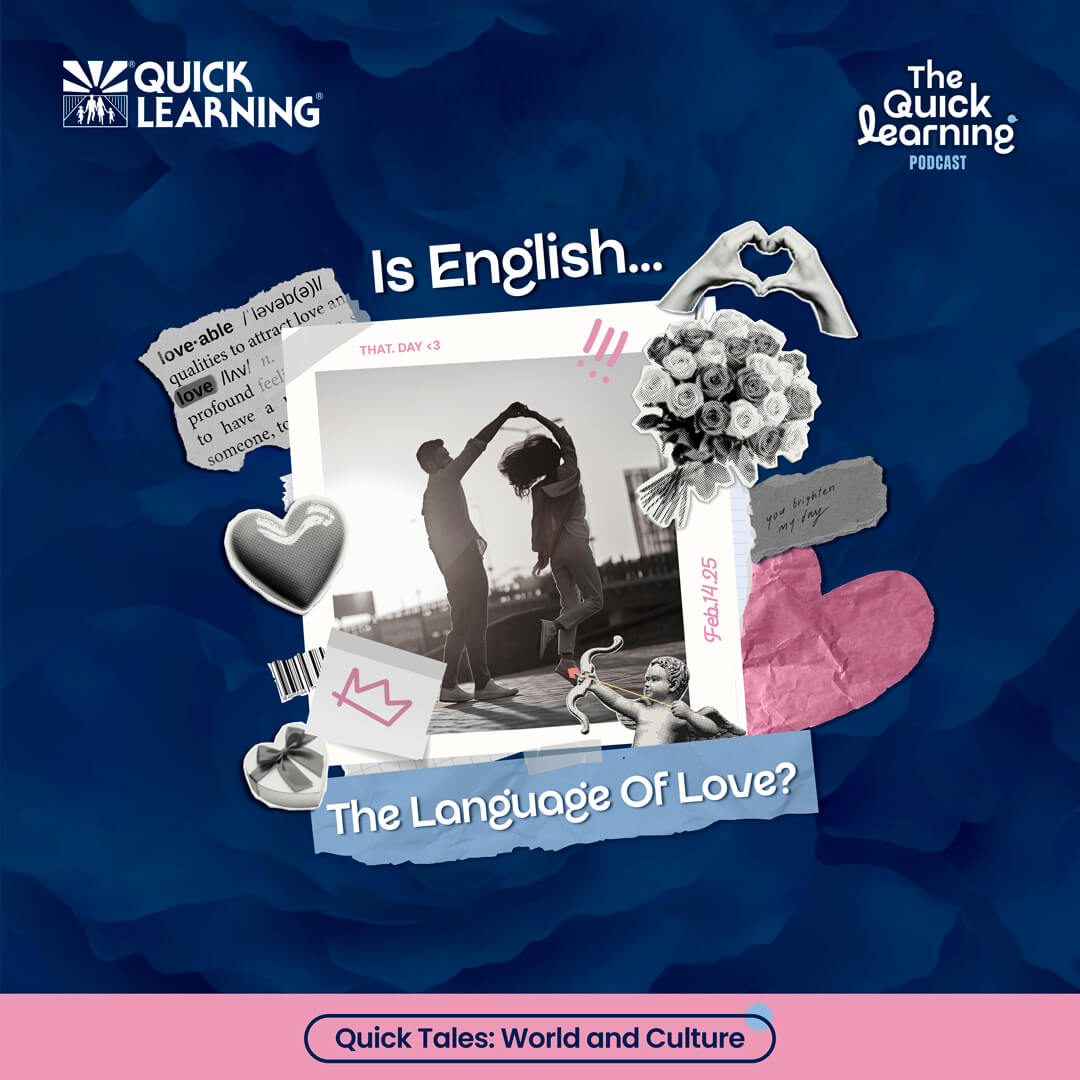
Hello there! Happy Valentine’s Day to you! Whether you’re spending this day with a special someone, your family, your friends, or even enjoying some time all by yourself— today is all about love and connection! I’m Sophie, and you’re listening to the Quick Learning Podcast, the place where we make English not just easy but something you can truly fall in love with— kind of like that first crush you had in school. Remember?
Today, we’re talking about the universal language of love: English! Okay, I know what you’re thinking— English might not have the poetic charm of French or the passionate flair of Spanish. In fact, it doesn’t even make the top ten romantic languages. But trust me, English has its own special way of expressing affection that’s both heartfelt and unique. So, let’s dive into why English deserves a spot as “The Language of Love.”
Alright, let’s start with some fun and interesting facts about love and the English language:
Did you know that the word “love” is one of the oldest words in English? It’s been around for over a thousand years! Plus, it’s everywhere in English literature— Shakespeare alone used it over 2,000 times in his works. That’s how deeply love and the English language are connected.
And in modern English, the word “love” is truly versatile. You can love a person, your pet, your favorite song, or even pizza! One little word covers so many kinds of affection, and that’s what makes it so simple and powerful.
Speaking of expressing love, did you know that over 1 billion Valentine’s Day cards are exchanged worldwide every year? And guess what— so many of those are written in English! That’s a lot of “Forever Yours” and “Be Mine” messages being shared.
Oh, and you’ve probably seen those little candy hearts with phrases on them, right? They’re called “conversation hearts,” and they’ve been a Valentine’s Day tradition since the 1860s. Back then, they were hand-pressed with messages like “Kiss Me” or “Be Mine.” Now, you’ll see phrases like “Text Me,” “BFF,” or even just the letters “I” and “U” with a heart between them. They’re such a fun and playful way to share affection— whether it’s romantic or just between friends.
Isn’t it amazing how a few simple words can carry such a big message of connection?
Now, let’s talk about how English speakers express love. One of the fun things about English is all the idioms we use to talk about feelings. For example, if someone says, “I am head over heels in love,” it means they’re completely
infatuated. Picture someone falling so hard in love they’re practically
flipping
over!
Then there’s the casual expression: “to have a crush on someone.” Have you heard that one? It’s a common way to say you like someone. For example, “I had such a crush on my neighbor in high school, but I never told him.”
Oh, and this one’s for the romantics who can’t hide their feelings: “wearing your heart on your sleeve.” It means you’re open about your emotions. If you’re someone who blushes or smiles when you see your crush, you’re probably wearing your heart on your sleeve!
There’s also “love at first sight.” This magical idea of falling in love the moment you see someone. Do you believe in it? Or is it more like “love after a few instagram posts”?
English might not have the romantic reputation of French or the fiery passion of Spanish, but it definitely has its own charm. It’s a straightforward language, yet it’s also heartfelt. Simple phrases like ‘You mean the world to me,’ ‘You’re my better half,’ or ‘I’m so lucky to have you in my life’ may not sound as poetic as an Italian sonnet, but they say everything you need to say in a practical, honest way.
Oh, and let’s not forget those little everyday English words we use to show appreciation— like ‘honey,’ ‘sweetheart,’ ‘darling,’ or ‘babe.’ Actually, did you know that in British English, it’s completely normal to call someone ‘love’ casually? Like, ‘How are you, love?’ And it’s not just for romance— it’s something you might hear between friends, coworkers, or even strangers. Pretty loving for a language, don’t you think?
Well, I guess love itself is a language, isn’t it? Sometimes, you don’t even need words to express how you feel for that special someone, a close friend, or a relative. A simple heart emoji can say it all. But here’s the thing— expanding your language knowledge also expands your possibilities to connect with the people around the world. English is spoken by over 1.5 billion people worldwide! That’s a lot of potential love letters, proposals, and Valentine’s messages you could write!
So, let’s wrap up with this thought: English is a language that brings people together. It’s not just about romance— it’s about expressing how you feel, whether it’s love, gratitude, or simple kindness. And even if English isn’t your first language, it can still be the language you use to share your heart with others. Who knows? Maybe this Valentine’s Day, you’ll write your very first love note in English.
Keep learning, keep connecting, and most importantly, keep spreading the love! Thanks so much for tuning in today. Until next time— Happy Valentine’s!




